
At least 15 dead in Canada highway collision
The semi-truck involved in Thursday's accident with a bus that killed 15 people in Manitoba, Canada, had the right of way at the time of the incident, according to the Royal Canadian Mounted Police.
2023-06-17 07:15
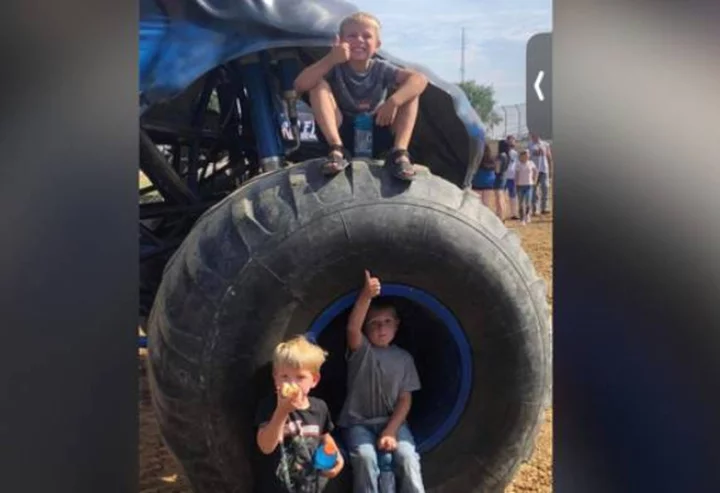
Father shoots dead three young sons and wounds mother at Ohio home, police say
An Ohio father allegedly shot dead his three young sons in the garden of the family home and wounded their mother. Chad Doerman, 32, was arrested in Clermont County and charged with murdering the three boys aged 7, 4, and 3, in the shocking incident, according to officials. The alarm was raised on Thursday afternoon when a female called 911 and screamed that “her babies had been shot,” reported ABC News. A second 911 call was then received several minutes later from a passerby who said that a young female had been running down the street screaming that “her father was killing everyone.” Clermont County Sheriff’s Office deputies responded to the home in Monroe Township, which is located 26 miles southeast of Cincinnati, where they found the suspect sitting on a step outside. He was taken into custody without incident. The sheriff’s office says that deputies then found “three unresponsive gunshot victims in the yard of the residence” and first responders immediately began life-saving measures. “All life-saving measures were unsuccessful and all three gunshot victims succumbed to their injuries while on scene,” they said. “A fourth gunshot victim, later identified as an adult female age 34, was also located outside of the residence. The female sustained what appeared to be a single gunshot wound to her hand [and was] non-life threatening.” Mr Doerman was interviewed by detectives and charged with three counts of aggravated murder. He was taken to the Clermont County Jail where he is currently being held without bond. David Gast, the chief prosecutor in Clermont County, spoke during an arraignment hearing on Friday. “The trauma that this man has inflicted on his family, community, law enforcement, first responders, and all the rest of us is unspeakable,” he said. “There has been a full admission in this case, the case is still new, we’re still discovering facts. But the evil horror of what we know is impossible to process. “In an act of incomprehensible cruelty, the father that stands before you lined up his three young boys and executed them in his own home with a rifle. In an act of desperation, the mother at some point grabbed the gun the father was wielding to attempt to protect them.” Read More DoJ releases scathing report of systemic abuse by Minneapolis Police after investigation prompted by George Floyd murder Synagogue shooter found guilty in deadliest attack on Jewish community in US history Clown performer’s 15-year-old son shot dead as he entertained children’s party
2023-06-17 06:59

US House Speaker McCarthy threatens to block funding for Chile waiver program
WASHINGTON U.S. House of Representatives Speaker Kevin McCarthy on Friday threatened to use congressional appropriations to block funding
2023-06-17 06:55
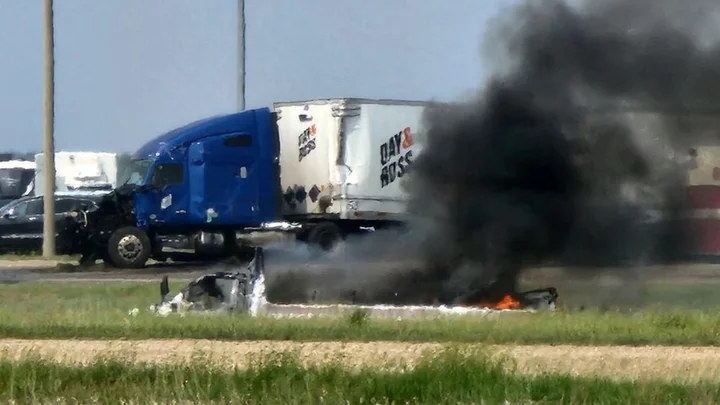
Six people critical and 15 dead after Canada highway crash
The crash is "one of the worst tragedies" ever seen in the province of Manitoba, an official says.
2023-06-17 06:53

Coffee research group progresses on naturally decaffeinated varieties
By Roberto Samora SAO PAULO A Brazilian coffee research institute has started a decisive stage in a two-decade
2023-06-17 06:24

Michael Jordan to sell Charlotte Hornets NBA team
US media reports the team is worth an estimated $3bn (£2bn) but details of the deal are undisclosed.
2023-06-17 06:24

Ukraine war: Putin confirms first nuclear weapons moved to Belarus
Russia's leader says the move is to remind anyone "thinking of inflicting a strategic defeat on us".
2023-06-17 06:15
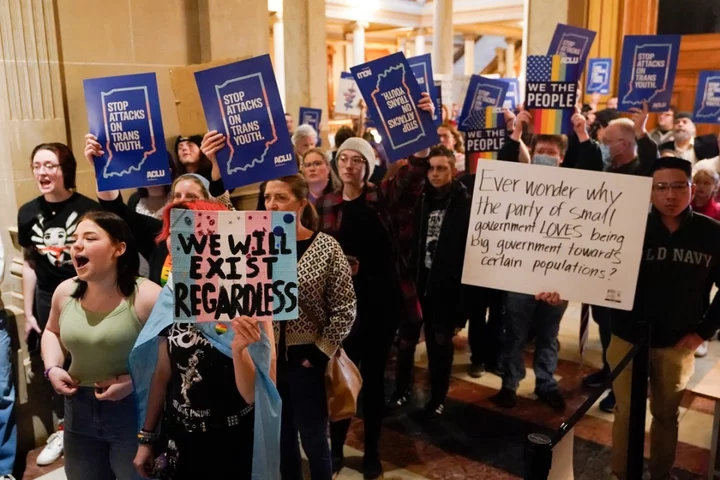
Trump-appointed federal judge blocks Indiana’s ban on gender-affirming care for trans youth
A federal judge in Indiana has partially blocked a ban on affirming healthcare for trangender youth, continuing a streak of victories in legal challenges against state laws targeting gender-affirming care. The ruling on 16 June from US District Judge James Patrick Hanlon, who was appointed by Donald Trump, issues a preliminary injunction against a recently enacted law that His ruling is the fourth recent courtroom victory for LGBT+ advocates who have challenged similar laws across the US, including a recent federal court ruling in Florida that eviscerated the state’s anti-trans policies and condemned the bigotry that fuelled such legislation. Indiana’s law, which was set to go into effect on 1 July, prohibits healthcare providers from allowing trans youth under age 18 to access hormone therapies, puberty blockers and affirming surgeries, which are not even provided to minors in the state. The American Civil Liberties Union and the ACLU of Indiana filed a lawsuit to block the law on behalf of four transgender youth and their families and Mosaic Health. “We warned lawmakers that if they passed laws attacking trans people that they would see us in court,” Chase Strangio, deputy director for transgender justice with the ACLU’s LGBTQ & HIV Project, said in a statement. “This victory belongs to the families who have bravely participated in this case, as well as other trans youth in Indiana who spoke up about the harms created by this law. Our work in Indiana and around the country is far from over – including with this law,” he added. Judge Hanlon, who was appointed to the federal judiciary by Mr Trump in 2018, stated in his ruling that “medical harms, including to mental health, can constitute irreparable harm,” including harm from being denied treatment for gender dysphoria. “And –again– there’s evidence that puberty blockers and cross-sex hormone therapy reduces distress for some minors diagnosed with gender dysphoria,” he added. “The risk of irreparable harm therefore supports a preliminary injunction.” By the end of May, state lawmakers across the country had introduced more than 500 bills impacting LGBT+ this year, including 220 bills specifically targeting trans and nonbinary Americans, according to an analysis from the Human Rights Campaign. More than 70 such bills have been signed into law. At least 19 states have enacted laws or policies banning affirming healthcare for young trans people, all against the guidance of health providers and major medical organisations, including the American Medical Association and the American Academy of Pediatrics. Read More Pioneering transgender lawmaker has advice for pushing back against transphobic bills NYC mayor Eric Adams signs bill protecting gender-affirming care Texas family moves so trans teen can escape anti-LGTBQ laws: ‘I’d rather be out than dead’
2023-06-17 05:46

Drugmakers want to stop Medicare from negotiating prices. Here's what you should know
In less than three months, the federal government is set to announce the initial 10 drugs subject to first-ever price negotiations in Medicare. Pharmaceutical companies and their supporters want to stop that from happening.
2023-06-17 04:54

Paramedic who found US couple dead in Mexico hotel says he felt ‘dizzy’ upon entering room
Paramedics in Baja California Sur who responded to the report of an American couple deceased in their hotel room said they felt symptoms consistent with carbon monoxide poisoning when they entered the room. Fernando Valencia and his partner were called to the Hotel Rancho Pescadero in El Pescadero around 9pm on Tuesday (13 June) after receiving reports that two Americans were unconscious. Upon arriving, Mr Valencia said he and his partner felt “dizzy” when they entered the room where they found 28-year-old Abby Lutz and 41-year-old John Heathco dead. “We went out of the room as soon as possible … I was afraid for my partner because my first thought in my mind was ‘are we going to die?’” Mr Valencia told Good Morning America. Lutz and Heathco were on a vacation in Mexico when they began to experience what Lutz’s family said are symptoms consistent with food poisoning. The two went to the hospital to seek treatment and by Monday (12 June) were feeling better. Between the time that Lutz texted her father on Monday and Tuesday evening, the couple died of “intoxication” by an unknown substance, according to the Baja California Sur attorney general’s office. Lutz’s family said they were told the couple’s deaths were due to “improper venting of the resort” with the possibility that it could be carbon monoxide poisoning. Mr Valencia called walking into the room “one of the worst experiences” of his life. He was especially worried for his and his partner’s health because he was working with his sister. The Baja California Sur attorney general’s office said in a statement that Lutz and Heathco had been dead between 10 and 11 hours by the time paramedics arrived. There were no signs of physical violence. In a statement provided to The Independent, Henar Gil, the general manager of Rancho Pescadero – a Hyatt property – said: “We are truly heartbroken by this terrible tragedy. Our hearts are with the impacted families and loved ones during this unimaginable loss.” “Local authorities are still actively investigating the situation, and the safety and security of our guests and colleagues remains a top priority, as always. We can confirm there was no evidence of violence related to this situation, and we are not aware of any threat to guests’ safety or wellbeing,” Ms Gil said. She added “We are working to care for those who have been impacted and we are working closely with authorities as they conduct their investigation to understand the cause of death. Further inquiries should be directed to local authorities.” US Department of State spokesperson Matthew Miller said they are “closely monitoring the investigation” into Lutz and Heathco’s deaths in a news conference on Thursday (15 June). “We stand ready to provide any consular – any appropriate consular assistance,” Mr Miller added. Read More An American couple were found dead at a luxury hotel in Mexico. Family fear they were poisoned Two Americans found dead in luxurious Baja California Sur hotel as family suspects carbon monoxide poisoning Thousands of dead fish wash up in Texas after overheated water chokes them of oxygen
2023-06-17 03:58
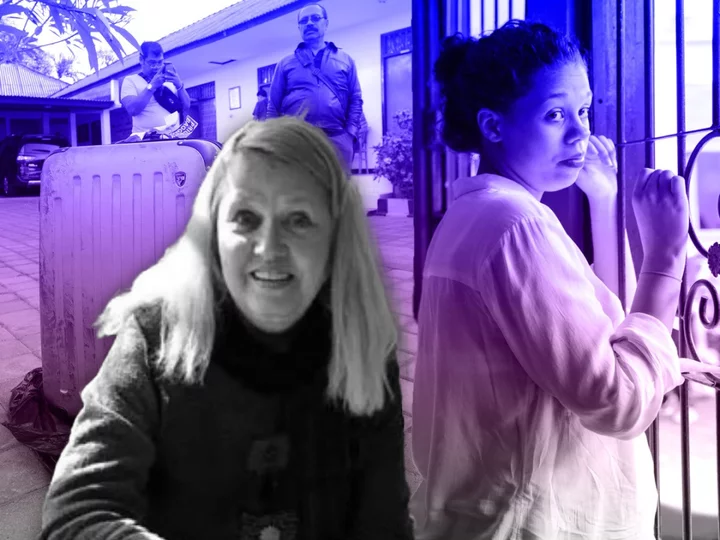
Heather Mack’s mother told police she feared her daughter would kill her. They were powerless to prevent it
The world first heard the story of American teenager Heather Mack and her mother Sheila von Wiese-Mack when the 62-year-old’s body was found stuffed in a suitcase in Indonesia. But the story actually begins many years earlier. Behind the headlines about the so-called “Suitcase Killer” is a tragic story of a mother who endured years of domestic violence at the hands of her child inside the home they shared in the Oak Park suburb of Chicago. Abuse which ultimately escalated to that day in 2014 when the 18-year-old and her 21-year-old boyfriend bludgeoned her to death at a 5-star resort in Bali. Rasul Freelain, a retired Oak Park Police sergeant who arrested Mack multiple times for allegedly abusing her mother, tells The Independent that the warning signs were there as soon as he met the pair for the first time back in 2010. What he saw was a sadly typical case of a domestic abuse victim reluctant to speak out or take action against the abuser that she loved. The violence grew progressively worse over the next few years until January 2013, when von Wiese-Mack made the chilling admission that she believed her daughter was going to kill her. But – due to the current lack of laws around child to parent domestic abuse – Sgt Freelain and the Oak Park authorities were ultimately helpless to save von Wiese-Mack from her fate. Nineteen months later, her tragic prediction became a reality. “It was like watching a slow-moving train derailment – we can see it and we all look and see it falling off into a ravine,” says Sgt Freelain. “I feel that on some level the entire criminal justice system failed Sheila.” He adds: “Her daughter of course failed her the most. Her child who she loved and raised and doted on and did everything she could to win her affection and approval betrayed her in a way no one could match.” Suitcase murder On 12 August 2014, Mack, then 18, and her then-boyfriend Tommy Schaefer, 21, bludgeoned von Wiese-Mack to death with the metal handle of a fruit stand at the luxury 5-star St. Regis resort in Bali. They then stuffed her body into a suitcase, hailed a taxi and loaded it into the trunk of the car. When they were unable to check out of the luxury resort – using her mother’s credit card – the couple fled the scene, leaving the bloodstained suitcase behind. They were soon tracked down to a budget motel and arrested on suspicion of murder. At the time of the murder, Mack – the daughter of socialite von Wiese-Mack and famed musician James L Mack – was pregnant with Schaefer’s child. Prosecutors revealed that she had flown her lover out on a $12,000 business-class ticket just hours earlier charged to her mother’s credit card. Chilling text messages also showed how the couple likened themselves to the notorious duo Bonnie & Clyde and plotted methods of murder with the help of Schaefer’s cousin Ryan Bibbs. They were both convicted of premeditated murder in Indonesia and narrowly avoided facing the firing squad. Mack’s baby Stella was born in Bali prison and was allowed to stay with her there for the first two years of her life. She is now being raised by von Wiese-Mack’s niece in Colorado. Bibbs was also convicted of conspiracy to kill von Wiese-Mack and sentenced to nine years in prison. After Mack served seven years in an Indonesian jail, she was extradited to the US, where she was arrested on charges of conspiracy to murder in a foreign country in November 2021. Since then, she has been behind bars in Illinois awaiting trial. On Friday (16 June), she pleaded guilty to one count of conspiracy to murder a US national under a plea agreement with prosecutors despite believing – by her own admission – that she has already done her time for her crime. It’s a horror case that has transfixed the nation for the past eight years and raised several questions due to the sheer brutality of von Wiese-Mack’s demise: How could a daughter have plotted her own mother’s death? How could she have then stuffed her own mother’s corpse in a suitcase? And why did she do it? But the bigger question – and one that has rarely been asked over the years – is could von Wiese-Mack’s murder have been prevented? History of violence In the years leading up to the murder, police records reveal that officers responded to a string of violent incidents committed by Mack against her mother at their home in Illinois. Oak Park Police records show at least 35 interactions with officers since 2008 including reports of Mack breaking her mother’s arm, biting her and punching her. The records also include reports of stealing credit cards and money – an apparent motive for the murder. While only Mack now knows when the violence first began, the first record of police being called to the home came in April 2008 for a report that the then-13-year-old had locked her mother in a room and threatened her. The next police report came in January 2010 when Mack allegedly punched her mother’s broken ankle. Sgt Freelain first met von Wiese-Mack in November of that year when she reported that her daughter had stolen her credit card and $1,060 cash. A detective specialising in youth and family issues at the time, he was assigned the case and says he met von Wiese-Mack in person and spoke with her on the phone several times. It was also the first time he met Mack, then aged 15. After interviewing her, Mack admitted that she stole her mother’s credit card but denied stealing the cash. “In that first meeting, I certainly saw how Sheila was torn in terms of what to do about Heather,” Sgt Freelain recalls. “She suspected and then knew that she had stolen from her but didn’t want to follow through on pressing charges against her daughter which is understandable but as things progressed that infliction would make things very difficult for us to be able to help Sheila. “In that first meeting it was clear something was wrong – in terms of both the financial side of things but also her daughter’s behaviour. “But it was the next time when I met Sheila in February 2011, that alarm bells really went off.” Sgt Freelain says that von Wiese-Mack turned up at the police department that night with her right arm broken and in a cast. In one violent incident that January, Mack had pushed her mother causing her to fall and break arm, according to a police report later filed. “Her body language – she looked so beaten back,” Sgt Freelain says of that day in February 2011. “In November, it was clear there was some kind of domestic dynamic that wasn’t good but Sheila hadn’t been forthright in elaborating about what was going on. “But that night I got her more comfortable talking and she opened up about the physical and verbal abuse. We established a good rapport that night that stayed over the next two-and-a-half years.” Von Wiese-Mack told him what had happened to her arm. “I told her ‘I’ve worked with families where the kids abuse the parents and it doesn’t fix itself’,” he says. “I told her about one case where a kid went on to murder their mother.” But when Sgt Freelain says he told von Wiese-Mack that they would have to arrest Mack and that she needed to press charges over the alleged attack, he says “reality hit” and she ran out of the police precinct. “She was so fearful of the idea of Heather being arrested,” he says. “I figured I would never see her again but she came back the next day to say she’d been attacked by Heather again. “An officer came and got me from the detective division and said a ‘woman is asking for you’. “I went out and it was Sheila Mack. She had been attacked and was crying and said ‘I’m sorry, I should have listened to you. Can you help me?’” He adds: “And that was the first day that I arrested Heather.” On 17 February 2011, Mack was arrested for the first time for domestic battery over the January attack on her mother that resulted in her broken arm. This marked a major step forward for von Wiese-Mack. Up until that point, Sgt Freelain says there was a pattern of her calling 911 to report Mack’s alleged attacks but then refusing to cooperate when police urged her to press charges. But it was a cycle von Wiese-Mack ultimately couldn’t get out of. Victim’s conflict “Her behaviour was completely consistent with other families I’ve worked with where kids have been abusive to the parents and in other broader situations of domestic or family abuse,” says Sgt Freelain. “It’s mirrored in what we see in intimate partner violence where the victim is very reluctant to speak out against their abuser. “Sheila’s conflict was ‘I don’t believe she wanted to break my arm, she was just mad at me.’ “It’s what we hear from so many victims of domestic violence.” Following Mack’s first arrest, von Wiese-Mack was given all the options for next steps and decided she did not want the case to go to court. But, by 14 April – less than two months later – Mack was arrested for a second time for biting her mother’s arm. Sgt Freelain was not the arresting officer in that case but, when he heard about it, he contacted von Wiese-Mack and urged her to seek court protection against her daughter. “The situation was escalating and I was trying to both keep Sheila safe and help Heather change her behaviour,” he says. “But Heather didn’t give things a chance and by the summer more and more reports were coming in about her behaviour.” Between that first arrest in February and the end of 2011, Oak Park Police records reveal no fewer than 10 separate interactions where police were called to the suburban home. The reports include incidents of biting her mother’s bicep, threatening her, running away and one where she is described as “out of control”. In early 2012, Mack was convicted of battery in juvenile court over the violence against her mother, according to Cook County juvenile records, obtained by The Chicago Tribune. Under the juvenile conviction, she was ordered to attend counselling, with a specific focus on anger management. Sgt Freelain says that the conviction initially caused von Wiese-Mack to distance herself from the help of police. “She went from thanking me for helping to navigate the chaos as Heather became more violent and aggressive to not speaking to me because Heather was detained,” he says. “You see it a lot in domestic abuse cases.” He adds: “We were going against Sheila’s hardwired desire to protect her own child. Heather was her only child – she was wired to keep her girl safe even though she was going to kill her.” As well as trying to protect von Wiese-Mack, authorities also tried to get Mack the help she needed to change her violent behaviour. Mack spent time at two separate facilities for juvenile offenders who suffer from mental health problems, receiving both inpatient and some outpatient treatment. As well as mental health services, Sgt Freelain connected the teenager with a female detective who specialised in connecting with at-risk girls who could act as her mentor. “My motivation was keeping Sheila safe but also saying what do we need to do for Heather to break this cycle,” he says. “It’s a duality we tried to balance.” Despite the efforts, the alleged domestic abuse continued. Throughout 2012, at least 15 police reports were made about Mack’s behaviour. ‘It wasn’t enough’ “Things then came to a head in January 2013,” says Sgt Freelain. As police records show, von Wiese-Mack confided in him for the first time that she feared her daughter was going to kill her. “When a victim says ‘I think this person is going to kill me, I believe them’,” he says. Sgt Freelain says he passed the information straight away to Mack’s probation officer who shared the same fears about the danger to von Wiese-Mack’s life. They tried to lay out a case that Mack had violated her court supervision and so should be jailed. But, von Wiese-Mack stopped cooperating again, he says, and so the case was dismissed in May 2013. The mother and daughter moved from Oak Park to Chicago, out of the jurisdiction of the police department. Fifteen months on from the case being dropped – and just over a year-and-a-half after von Wiese-Mack disclosed her fears for her life – her only daughter and her boyfriend beat her death. Sgt Freelain recalls the moment he heard about von Wiese-Mack’s murder. “I was driving my car and it came out on the local news radio… I had to pull the car over to the side of the road,” he says. “What Sheila said had happened. It was information overload. I started pounding the steering wheel and saying ‘no, no, no’ in the car. I couldn’t fathom that it had happened even though it was like watching a slow-moving train derailment.” Sgt Freelain says he also recognised the name of Mack’s accomplice Schaefer, having tried “to take him under my wing” while working as an officer at a school that he attended. For the retired detective, he is confident that he did everything he could under the law to try to save the 62-year-old. “In the police department, I felt we were very thorough in terms of documenting every interaction we had and trying to get Sheila to press charges,” he says. “I was the first person who arrested Heather and I arrested her four times in total. I worked to get her convicted and then tried to get her probation violated. “But it just shows it wasn’t enough.” Gaps in the law In the way was the lack of laws protecting parents from domestic violence at the hands of a child or teenager. In Illinois and many other states, there are laws protecting children from abuse by their parents and other adults. There are laws protecting elders from abuse. And there are also laws protecting adults from abuse by domestic partners and other adults in the home. But there are currently no laws in Illinois protecting parents from abuse from their minor children. What this meant was that, once von Wiese-Mack stopped cooperating and refused to press charges, authorities had no power to push ahead and take action against Mack. Sgt Freelain explains that if Mack had been 18 – and therefore an adult under the law – things would have been very different. As it was, Mack was just five months away from her 18th birthday when the case was dismissed. Sgt Freelain asks: “Why is Sheila any safer from a 17-and-a-half-year-old than from an 18-year-old?” “If Heather had been an adult, in Illinois there would have been all kinds of mandatory things that would have kicked in after even one attack,” he says. “She would have been put in jail overnight, there would be a list of restrictions, a mandatory appearance in domestic violence court, an almost guaranteed second court appearance and – even if Sheila stopped cooperating – we could have continued to prosecute Heather. “In other forms of domestic violence, we have things in place that even if the person tells the judge or prosecutors that they don’t want to cooperate, we can continue with the prosecution. But none of those things are in place for child to parent violence.” Because of the lack of laws recognising child to parent abuse, their hands were tied. Here was a case where the same laws that can be used to protect victims of abuse by their partner, child victims of abuse by their parents, victims of elder abuse, or abuse by any domestic adult within the home, could not protect a parent being abused by her child. The state of Illinois is far from alone with this issue. The very first law recognising child to parent abuse (CPA) also came into force in Florida six years ago. And von Wiese-Mack is also far from alone in her suffering. While CPA may be less common and rarely spoken about when compared to partner-to-partner violence or child abuse, it is still far too common. A 2018 study, which looked at 60 years of research, found that CPA exists in between 5 and 21 percent of families. Due to underreporting – perhaps in part due to a stigma on the issue – the true figures are actually expected to be higher. Von Wiese-Mack appears to have felt that stigma. Sgt Freelain recalls that she once attended a support group for domestic violence but, after finding herself the only person in the room being abused by their child, she never went back. While it’s impossible to know, Sgt Freelain believes that the system failed von Wiese-Mack and that her horrific and tragic death may well have been avoided. “I strongly believe that if the systems that are in place for adults who abuse women, if those laws and protocols had been in place for child and teenage abusers, then there would be a greater chance Sheila would not have been killed on August 12 2014,” he says. Logistically, he points out if the case hadn’t been dismissed by the court in May 2013 and Mack had been found in violation of the court order, she would have been sent to jail at 17 and turned 18 behind bars that October. Leaving jail as an adult, she would have then been on parole for any future domestic situations on her release. “It could have changed the dynamic,” he says. Need for change This is why the retired police officer is now pushing for a change in laws to recognise child to parent abuse and shore up the gaps in protections and available responses. He is also calling for more training for police and schools on CPA and improved access to mental health services to support young people like Mack. He is writing a book on the topic centred around this tragic case, with the blessing of von Wiese-Mack’s family. “There are gaps in the criminal justice system – do I feel it let Sheila and Heather down? Yes.” “Sheila lost her life and it’s had a catastrophic effect on people who cared about her and Heather. And it’s sad for Heather as well. I wanted the best for her too,” he says. “It’s a tragedy on all sides. “So I’m motivated by two things: to try to honour the memory of Sheila. We hear about her as someone shoved in a suitcase and about Bonnie and Clyde but what about the victim? She wasn’t perfect but she loved her daughter and wanted to give her the best life and no one deserves to be abused the way she was,” he says. “The second motive is to bring awareness of how this case is an extreme example of what can happen with child to parent abuse if we don’t bring about change in society. We have got to figure this out. “There’s not a day I don’t think about this case and about how families like Sheila and Heather need assistance. Where Sheila and I didn’t agree was because she accused me of pushing too hard and I kick myself now as I feel like I didn’t push hard enough.” This month von Wiese-Mack should be turning 75. Instead, her daughter has just pleaded guilty to conspiring to kill her and now faces up to 28 more years behind bars at her sentencing in December. The sad irony of Sheila’s case is that, were it not for the tragic ending, no one would ever have known the years of abuse she endured behind closed doors. “If it wasn’t for the suitcase, the world wouldn’t have known about this. The world knows because of the horror and because what they had to do to get her in there was unthinkable,” says Sgt Freelain. “But there’s more to it. It’s the unthinkable combination of years of unthinkable abuse.” Read More Heather Mack plea hearing – live: ‘Suitcase killer’ to plead guilty in US over Bali murder of socialite mom A body in a suitcase, Bonnie and Clyde fantasy and baby born in Bali prison: The chilling case of Heather Mack ‘Suitcase killer’ Heather Mack pleads guilty to conspiracy to murder – facing up to 28 years in US prison Heather Mack plea hearing – live: ‘Suitcase killer’ to plead guilty in US over Bali murder of socialite mom ‘Suitcase killer’ Heather Mack pleads guilty to conspiracy to murder – facing up to 28 years in US prison A body in a suitcase, Bonnie and Clyde fantasy and baby born in Bali prison: The chilling case of Heather Mack
2023-06-17 01:59
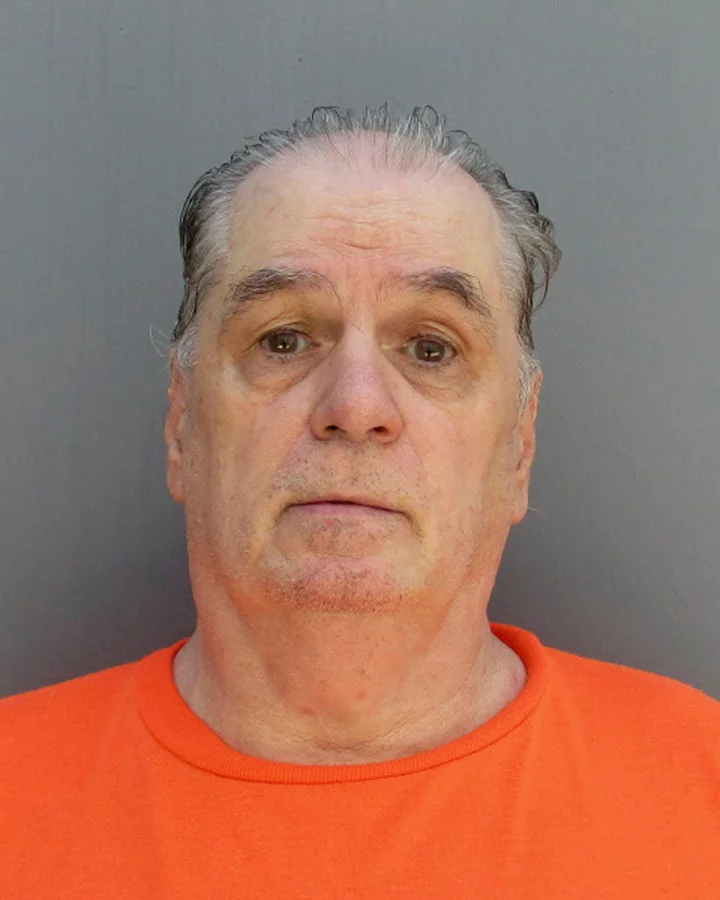
Arizona man on death row for 29 years is released after conviction for girl’s murder is thrown out
An Arizona man who was convinced and sentenced to death in the death of a four-year-old was released from prison on Thursday (15 June) after serving 29 years in prison. Barry Lee Jones, 64, was accused of murder, child abuse and sexual assault in the death of his girlfriend’s daughter, Rachel Gray, in 1994. For nearly 30 years, Mr Jones has maintained his innocence that he did not sexually assault or kill her. Now, after a years-long appeal process, a Pima County judge ordered Mr Jones’s release after approving a deal that Mr Jones’s defence team struck with prosecutors who said a medical re-examination of the case didn’t support a finding that Mr Jones caused the girl’s injury. Mr Jones pled guilty to second-degree murder. The Arizona Attorney General’s Office said evidence supported that because Mr Jones was caring for Rachel at the time, allowing her to die as a result of her injuries. “After almost 30 years on death row for a crime he did not commit, Barry Jones is finally coming home,” Cary Sandman, a federal public defender who represented Mr Jones for over 20 years said as reported by the Arizona Republic. The case In early May 1994, Mr Jones drove his girlfriend, Angela Gray and her four-year-old daughter to a Tuscon hospital, where the child was pronounced dead upon arrival. Mr Jones had been living with his daughter, Ms Gray and her three daughters for approximately three months at the time of the incident in a trailer park in Tuscon. Doctors noted the young child had bruises covering her body and a cut on her head. An autopsy showed that Rachel’s death was caused by a small bowel laceration due to “blunt abdominal trauma” according to an investigation from The Intercept. Immediately fingers were pointed at Mr Jones and Ms Gray. Mr Jones reportedly said Rachel was injured while on his watch the day before but it was not his doing. The young girl had hit her head after falling from his parked work van. The four-year-old told Mr Jones a little boy pushed her out of the van and hit her in the stomach with a metal bar. However, the key witnesses comprised of eight-year-old twins and Rachel’s 10-year-old sister, claimed they may have seen Mr Jones hitting Rachel. Mr Jones was arrested and charged with child abuse as well as the murder and sexual assault of Rachel. He was found guilty by a jury in April 1995. However, in Mr Jones’s appeals, it is noted that the jury did not receive all of the information related to the case – like evidence that alleged Ms Gray had been abusive toward her children and potential predators interacted with Rachel. The appeal Mr Jones’s first appealed in 1997 but the Arizona Supreme Court upheld the conviction. He tried to appeal again in 2008, this time federally, but it was denied. Finally, in 2014, Mr Jones’s case was remanded to a federal district judge after new evidence emerged about the young boy who hit Rachel in the stomach with a metal bar. The federal judge called for Mr Jones’s release in a July 2018 ruling, concluding Jones’ earlier lawyer had failed to adequately investigate whether the girl’s injuries were suffered during the time she was alone with him. Experts testified that Rachel may have been injured earlier. The judge’s ruling was upheld by an appeals court, though Jones remained in prison. But the US Supreme Court reversed the decision a year ago, with Justice Clarence Thomas saying the federal courts are generally barred from taking in new evidence of ineffective assistance of counsel that could help prisoners. With Mr Jones still behind bars, his attorneys struck a deal with prosecutors for his release. Under the agreement, once his convictions and death sentence were thrown out, Mr Jones pleaded guilty to a second-degree murder charge in connection with his failure to seek medical care for the girl. He was sentenced to 25 years in prison and will be given credit for time served. Now that Jones’ death sentence has been thrown out, Arizona has 110 people on its death row. Read More Arizona woman alleges sexual assault by Trevor Bauer; he denies allegation and countersues Australian man sentenced to 9 years in prison for gay American's 1988 manslaughter US Marine among two men arrested for firebombing California Planned Parenthood Heather Mack’s mother told police she feared her daughter would kill her. They were powerless to prevent it Woman accused of murdering husband ‘pushed him’ while holding knife, jury told
2023-06-17 01:55
